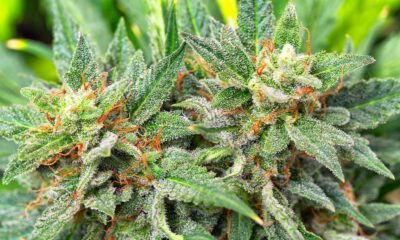
Joint Opinions
Harvard Professor Writes Questionable Defense of Trump’s Reefer Madness
Kevin P. Hill offers a signal-boost of the U.S. Surgeon General’s cannabis advisory that nobody needed.
In an essay published on NBCNews.com on Sept. 20, Kevin P. Hill, an addiction psychiatrist and professor at Harvard Medical School, provided a welcome distraction from the ongoing moral panic over vaping — which to date is believed to have killed 12 Americans, or fewer than half the number of humans on bicycles killed by cars in New York City this year — by offering instead a defense of modern-day “reefer madness.”
In late August, just as the first few reports of a mysterious lung ailment possibly related to vaporizer use were surfacing, Jerome Adams, Donald Trump’s current surgeon general, released the first Surgeon General’s advisory on cannabis in 37 years.
Cannabis, according to Adams and Alex Azar, the current Secretary of Health and Human Services, is a “dangerous drug” that poses a particular threat to youth and to pregnant women — many of whom are under the mistaken impression that using weed, which is many magnitudes more powerful than it used to be, is relatively risk free.
“This ain’t your mother’s marijuana,” warned Adams, who declared without equivocation, that cannabis use is linked to lowering IQs, plummeting school performance and even suicide.
The next day, the official Surgeon General Twitter account posted the claim, refuted numerous times by numerous studies, that legalization has led to more youth cannabis use.
Surgeon General Jerome Adams: “This ain’t your mother’s marijuana.” https://t.co/GCRTiO5ls8 pic.twitter.com/j77GP0YP12
— The Hill (@thehill) August 29, 2019
Rather than point out the Surgeon General’s many misstatements and outright fabrications, Hill instead chooses to amplify them while chasing a few apparent beliefs of his own. The public, Hill asserts, have been bamboozled by an “historical narrative” into believing that “weed is safe and good for you.” He laments the paucity of science on cannabis’s benefits (something that even legalization advocates could agree on) while also suggesting that legalization, despite the often draconian restrictions under which it has been cautiously advanced, itself suggests that cannabis can be used “whenever, however, and with whomever we want.”
And Hill also draws a connection between high-potency cannabis and “potentially disastrous results” like the vision of a teenage wasteland of increased psychosis, physical dependence, and declining function invoked by Surgeon General Adams — whose claims Hill does not see fit to examine critically. This is probably because the assumptions on which Hill’s offering to the discourse are based rely on the same thin evidence as Adams’s. That is, they’re thinner and weaker than a roll of off-brand paper towels in the rain and include at least a few strawmen of Hill’s own making for good measure.
Hill writes that “increasing legal access to weed does not and should not imply that weed is risk-free.” To this, Hill should be asked, “Who, exactly, made such an implication?” It certainly was not any pro-legalization campaign. In every recent political effort where legalization was at stake, accepted as gospel were the notions that cannabis and kids are a bad mix; that cannabis should not be consumed in public or most anyplace, ever; and that individual counties, cities, and towns should be allowed to ban legalized cannabis for any reason whatsoever (or no reason at all). And all this —restrictions that are not applied to alcohol or tobacco outside of “dry counties” in the Bible Belt, a vestige of a bygone era — came from the pro-legalization side! Whether a political decision or not, every legalization effort accepts that cannabis use carries risk and is thus an activity that should not be done by anyone aside from an adult 21 or over, and even then only in certain environments.
To buttress his assumption that the general public — the same public of whom 40% can be relied upon to oppose legalization wherever it appears on the ballot — has been fooled into thinking weed is safe, he offers the results of an online survey conducted by a University of California, San Francisco researcher. The researcher, a physician, admits that there’s limited evidence that cannabis is harmful (this despite decades of prohibition and many studies that set out to show some harm, such as the UCLA lung-health study that instead showed long-term cannabis use wasn’t associated with lung issues) but that there could be harm out there somewhere we just haven’t found yet, despite almost two centuries of well-documented use dating back to the British Raj. More problematic for Hill is that the study does find that a vast majority of Americans admit cannabis use carries harms, just maybe not the harms Hill wants us to worry about.
Perhaps worst of all is Hill’s suggestion of a nexus between the increased availability of high-potency cannabis and incidences of serious mental health problems like psychosis. There are two serious problems here. One is that “the weed is stronger than ever before!” is a claim that has been made for almost four decades — with increasingly shameless disregard for facts.
In 1975, authorities told us that cannabis was 20 times stronger than it was in the 1960s. In 1986, according to NIDA, cannabis was seven times stronger than it was in the 1970s. In the mid-1990s, according to Joe Biden, using cannabis was analogous to using a “laser-guided missile” as opposed to a shotgun. Exaggerations like this hide the limited truth on which they are based.
Cannabis potency has absolutely increased. A decade ago, the Royal Canadian Mounted Police reported that the average strength of cannabis confiscated was 11.1% THC, up from 4.8% in 1988, an increase of about 125%. But any link between potent cannabis and accompanying health problems is questionable at best. And while adults do seem to prefer stronger cannabis, Hill’s axiomatic suggestion that this is in any way problematic is undercut by his own admission that science is sorely lacking.
And what’s the missing and unspoken second leg of the suggested logical argument? “Today’s cannabis is more potent; therefore, today’s cannabis users are all using more potent cannabis.” Is this true? To assume yes would dismiss the CBD craze and those users seeking out THC-CBD blends. About the worst case scenario Hill can conjure is the “unpleasant and scary” outcome when an edibles consumer, either deliberately or by misadventure, eats too much weed. While definitely very bad and avoidable, edibles scare-tactics have largely evaporated thanks in part to strict new state regulations that limit edibles to no more than 100 milligrams of THC per package. This does extremely sick patients who need much more than that to manage pain or other serious symptoms a grand disservice — and apparently hasn’t done much to satisfy the pearl-clutchers’ cynical fear-mongering.
Hill does make a few good points. He calls for “sensible, evidence-based education on weed for all stakeholders… to bridge the gap between the science of cannabis and public perception.” He also recognizes that the science, such as it is, is sorely lacking and lagging far behind society. Though he oddly has praise for the National Institutes of Health, which has been notoriously tight-fisted with research money and has also earned a reputation for only funding cannabis-related studies having to do with abuse rather than health or wellness, while also failing to mention the very salient fact that the only government-approved cannabis available for research is the very same weak stuff he earlier declared irrelevant.
The good thing about Adams’s own screed, the latest incidence of health officials using the power of their office for political purposes, is that it went away quickly and was replaced by the panic over vaping. Hill is surely a clever fellow, well-educated and well-read. Why he’s choosing to spend his time and a national platform on a crusade in search of a problem is his business, but amplifying Adams’s blinkered logic was not the contribution to the discourse anyone needed — anyone except Adams and the anti-legalization brigade.
TELL US, what is the craziest “reefer madness” story you’ve heard?

























